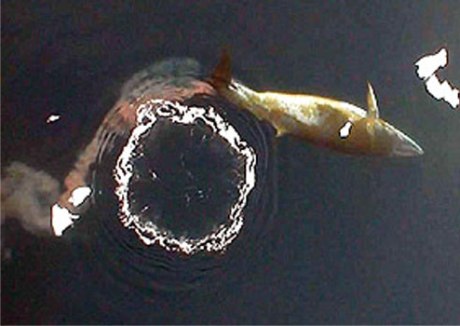
Posted on 10/25/2012 9:29:56 PM PDT by neverdem
A changing Gulf Stream is warming deep waters along the eastern United States and destabilizing greenhouse gases trapped in sediments.
Somewhere off the eastern coast of North Carolina, a frozen mixture of water and methane gas tucked in seabed sediments is starting to break down. Researchers blame a shifting Gulf Stream — the swift Atlantic Ocean current that flows north from the Gulf of Mexico — which is now delivering warmer waters to areas that had previously only experienced colder temperatures.
“We know methane hydrates exist here and, if warming continues, it can potentially lead to less stable sediments in this region,” says Matthew Hornbach, a marine geologist at the Southern Methodist University in Dallas, Texas, who led the study that is published online today in Nature1. The results suggest that the warmer temperatures are destabilizing up to 2.5 gigatonnes of methane hydrate along the continental slope of the eastern United States. This region is prone to underwater landslides, which could release the methane, a powerful greenhouse gas.
Whether that methane would make it to the atmosphere and worsen global warming is unclear, but scientists think that it is unlikely. “We don’t need to worry about any huge blow of methane into the atmosphere,” says Carolyn Ruppel, a geophysicist at the US Geological Survey in Woods Hole, Massachusetts. Rather, she says, Hornbach and his co-author Benjamin Phrampus, also of the Southern Methodist University, have uncovered a powerful new way to use data from the geological record to catch non-anthropogenic climate changes that are already happening...
(Excerpt) Read more at nature.com ...
http://curiosity.discovery.com/question/how-was-methane-hydrate-discovered [snip] It wasn’t until the 1960s that methane hydrate was discovered as a naturally occurring element. Scientists first discovered the solid natural gas in a gas field in western Siberia. In 1982, scientists retrieved a deep-water sample near the Guatemalan coast that helped spark U.S. research and development into methane hydrate as an energy source. [/snip]
The piece sounds like grant fishing to me. Screw around at sea, write about a hypothesis, use that for the basis of a grant application

How about granting ourselves the right to harvest that methane?
Mann?
If I recall correctly, far more methane is produced by microbes under the ocean than on land, the vast majority of all photosynthesis and respiration on Earth also occurs in the ocean as well. Last time I heard, there’s still plenty about our oceans and water-filled caverns left to be discovered.
If a pig had wings...
Disclaimer: Opinions posted on Free Republic are those of the individual posters and do not necessarily represent the opinion of Free Republic or its management. All materials posted herein are protected by copyright law and the exemption for fair use of copyrighted works.